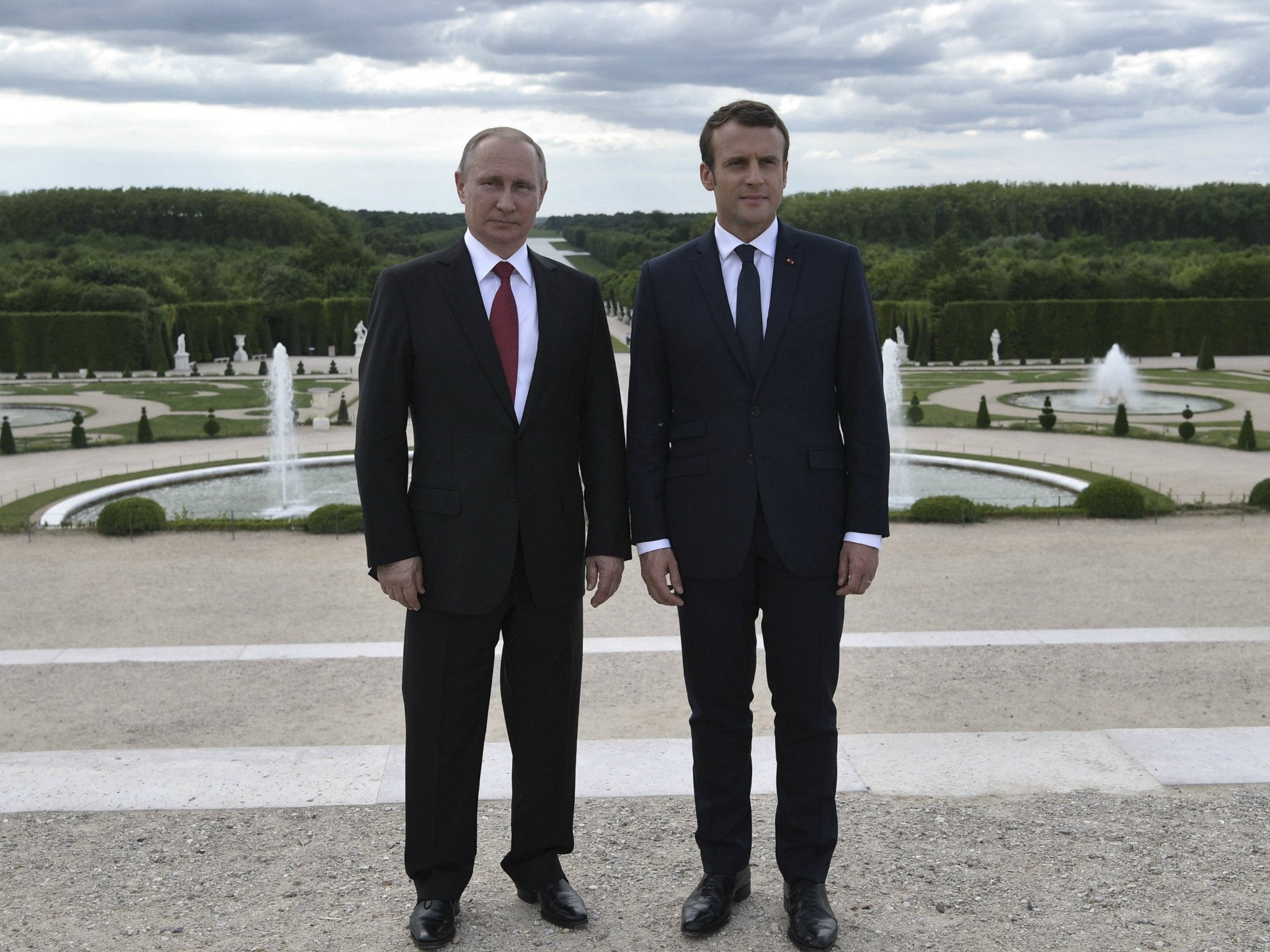Emmanuel Macron denounces 'lying propaganda' of some Russian media as he meets Vladimir Putin
Mr Macron says the leaders had a 'frank exchange' over issues such as Syria and Ukraine

French President Emmanuel Macron has rolled out the red carpet for Russia's , but past suspicions of Russian meddling in the French election resurfaced with Mr Macron denouncing Russian media and Mr Putin denying hacking allegations.
The newly-elected Mr Macron hosted Mr Putin at the sumptuous 17th century palace of Versailles outside Paris for his first meeting with the Kremlin leader which he had earlier said would be marked by some straight talking.
The 39-year-old French leader and Mr Putin exchanged a cordial, businesslike handshake and smiles when the latter stepped from his limousine, with Mr Macron appearing to say “welcome” to him in French.
When they emerged from talks, which went on for almost an hour longer than scheduled, Mr Macron said they had had a “frank exchange” and both men stressed they had agreed on the need to move forward on divisive issues such as Syria and Ukraine.
But at a joint news conference after their talks, ill-feeling came to the surface over past allegations made by Mr Macron's camp that state-funded Russian news outlets had sought to destabilise his campaign.
With Mr Putin alongside him, Macron repeated the accusation in a reply to a journalist's question, saying: “During the campaign, Russia Today and Sputnik were agents of influence which on several occasions spread fake news about me personally and my campaign.
“They behaved like organs of influence, of propaganda and of lying propaganda,” he said.
During the campaign, which climaxed with Mr Macron's election on 7 May, Mr Macron's camp irritated the Kremlin by saying its campaign's networks, databases and sites had come under attack from locations inside Russia.
When his camp barred journalists from the two Russian outlets from Mr Macron's headquarters, a Russian Foreign Ministry spokeswoman denounced the move as “outrageous ... bare-faced discrimination”.
The Kremlin and RT itself have rejected allegations of meddling in the election.
Mr Putin did not react to Macron's comments about the Russian media, but he bristled when a journalist suggested that Moscow's hand was behind cyber attacks on the Macron campaign. These hacking allegations, he said, were not based on facts.
The Kremlin appeared to favour Mr Macron's far-right opponent Marine Le Pen for the presidency during the campaign - a view reinforced when Mr Putin granted her an audience a month before the election's first round.
This did not indicate an attempt to influence the outcome of election, though, Mr Putin said.
“We are ready to receive any person, always. If Madame Le Pen asked to meet us, why would we want to refuse her? .. The more so since she always publicly spoke out for developing relations with our country. It would be strange for us to refuse her,” he said.
Both sides though sought to present Mr Putin's visit, which was intended to mark 300 years since Tsar Peter the Great visited France, as an occasion to relaunch Franco-Russian relations.
Mr Macron, who took office two weeks ago, has said dialogue with Russia is vital in tackling a number of international disputes. Nevertheless, relations have been beset by mistrust, with Paris and Moscow backing opposing sides in the Syrian civil war and at odds over the Ukraine conflict.
Mr Macron, whose country is part of a Western coalition that supports rebel groups and has accused Syrian President Bashar al-Assad of using chemical weapons, said any further use of chemical weapons in Syria was a red line for France which would result in reprisals.
But he said France and Russia, which backs Mr Assad, should work together on Syria and he said he wanted France and Russia to boost sharing of intelligence in working together to find a political solution to the conflict.
Sounding less forthcoming, Mr Putin said he was not sure if France's Syria policy was “independent” because it was part of a US-led alliance, adding that Paris and Moscow had both points of disagreement and agreement over Syria.
Mr Macron also said he and Mr Putin were agreed the time was right for a new round of peace talks on Ukraine in the “Normandy format” which groups Russia, Germany, France and Ukraine.
Mr Macron made no mention of Western sanctions on Russia over Ukraine, though Mr Putin repeated Moscow's view that their continued enforcement would not help stabilise the situation in Ukraine's east.
Mr Macron said he had also brought up the plight of gay men in Russia's Chechnya following Russian media reports of torture and Putin had agreed to “look into the activities of local authorities”.
Mr Putin later went to an exhibition on Peter the Great, who visited France in 1717. Macron showed him a painting of the young Louis XV, who was king of France at the time of the visit. Mr Putin also commented on a painting depicting Russian Empress Catherine the Great.
Mr Putin also went on to visit a newly-opened Russian Orthodox cathedral in Paris. He had been due to attend the inauguration of the cathedral in October, but he cancelled the trip to France after then President Francois Hollande accused Russia of war crimes in Syria and refused to give him a red carpet welcome.
Reuters
Join our commenting forum
Join thought-provoking conversations, follow other Independent readers and see their replies
Comments